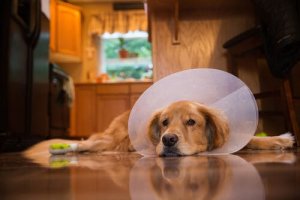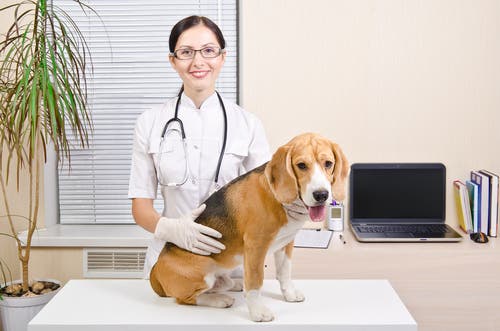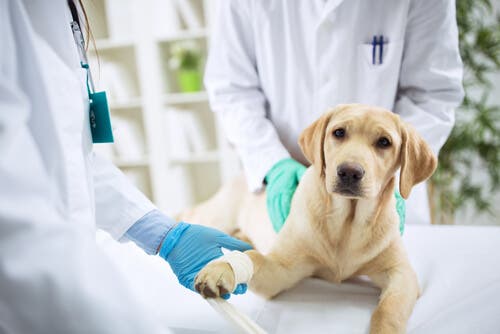Post-Operative Dog Care: What You Need To Know


Written and verified by the lawyer Francisco María García
Every dog owner knows that a dog is part of the family. We’re obviously concerned about their well-being. In fact, one of the most difficult moments with our dogs is when they have to have surgery. So, it’s important to learn about proper post-operative dog care.
When your dog needs an operation, the care following the surgery will be essential for their recovery. In fact, it doesn’t matter what kind of operation it is. The proper post-operative dog care is what will ultimately guarantee a successful recovery.
However, keep in mind that this process is just as distressing for your dog as it is for you. They have to enter an unknown place, leave their daily routine, and endure pain and discomfort. In fact, this can greatly affect your dog. As a result, the key is to make your dog feel as comfortable and safe as possible.
How long your dog stays in the clinic will, of course, depend on the seriousness of the surgery. However, most complicated surgeries usually only require the dog to stay in the clinic for a few days.

When the vet discharges your dog, then you’ll need to know how to care for your dog at home.
Know the proper post-operative dog care
- Unless your vet otherwise instructs you, you shouldn’t feed your dog after surgery. In fact, it’s generally necessary to wait at least 24 hours after surgery to feed them. Your dog may vomit from the anesthesia. However, it’s important to give them water frequently and make sure they stay hydrated.
- Create a comfortable area for you and your dog. This should be a calm place, away from any constant activity. Additionally, it should be an area where you can easily supervise your dog. Also, try to give them a place to relieve themselves nearby, and where they can eat.
- Your pet won’t probably have much of an appetite for the first few days after the surgery. To gradually help them recover, try giving them broths or soft food during this time. You can also look for food that’s specially made for post-operative dog care.
- If your vet prescribes medication, make sure you administer them exactly as directed. You can also ask the vet the best way to give your dog any medicine. We all know how difficult it can be to make your dog take pills!
- You have to make sure the surgery wound stays clean and dry. This will prevent infection. You should clean the wound with antiseptic and gauze as often as the vet recommends. You also should be aware of any changes to the wound. Notify your vet immediately if you notice any redness, pus, or inflammation.
- If your vet recommends keeping the wound covered, you’ll need to make sure the bandages stay dry. Also, try to prevent your dog from ripping them off.

Precautions to promote proper wound healing
- Dogs tend to lick their wounds. Therefore, one of the most important post-operative dog care tasks is preventing your dog from licking or biting their wound. In order to do this, you can get a recovery cone collar. Your dog needs to wear this for at least 15 days or until the vet says the wound has completely healed.
- You also need to observe your dog’s bathroom habits. If you realize that your dog hasn’t resumed defecating and urinating normally, then you’ll need to contact your vet.
- Make sure your dog avoids exercise. After surgery, your dog needs to rest. While your dog will naturally want to rest for a few days, it will eventually want to run and play again. Try to make sure your dog avoids any physical activity until the wound has healed. Moreover, make sure your dog doesn’t try to go up or downstairs.
- If you have kids, explain that they can’t play with the dog for a while. Additionally, it can be a good idea to teach your kids the basics of post-operative dog care as well.
- If you have several pets at home, we recommend that you separate them during your dog’s recovery. A fight or a simple game could affect the wound. Any further damage to the wound can lengthen recovery time.
Always remember that the success of surgery goes beyond the operating room. The post-operative dog care you provide at home will guarantee the full recovery of your pet.
Every dog owner knows that a dog is part of the family. We’re obviously concerned about their well-being. In fact, one of the most difficult moments with our dogs is when they have to have surgery. So, it’s important to learn about proper post-operative dog care.
When your dog needs an operation, the care following the surgery will be essential for their recovery. In fact, it doesn’t matter what kind of operation it is. The proper post-operative dog care is what will ultimately guarantee a successful recovery.
However, keep in mind that this process is just as distressing for your dog as it is for you. They have to enter an unknown place, leave their daily routine, and endure pain and discomfort. In fact, this can greatly affect your dog. As a result, the key is to make your dog feel as comfortable and safe as possible.
How long your dog stays in the clinic will, of course, depend on the seriousness of the surgery. However, most complicated surgeries usually only require the dog to stay in the clinic for a few days.

When the vet discharges your dog, then you’ll need to know how to care for your dog at home.
Know the proper post-operative dog care
- Unless your vet otherwise instructs you, you shouldn’t feed your dog after surgery. In fact, it’s generally necessary to wait at least 24 hours after surgery to feed them. Your dog may vomit from the anesthesia. However, it’s important to give them water frequently and make sure they stay hydrated.
- Create a comfortable area for you and your dog. This should be a calm place, away from any constant activity. Additionally, it should be an area where you can easily supervise your dog. Also, try to give them a place to relieve themselves nearby, and where they can eat.
- Your pet won’t probably have much of an appetite for the first few days after the surgery. To gradually help them recover, try giving them broths or soft food during this time. You can also look for food that’s specially made for post-operative dog care.
- If your vet prescribes medication, make sure you administer them exactly as directed. You can also ask the vet the best way to give your dog any medicine. We all know how difficult it can be to make your dog take pills!
- You have to make sure the surgery wound stays clean and dry. This will prevent infection. You should clean the wound with antiseptic and gauze as often as the vet recommends. You also should be aware of any changes to the wound. Notify your vet immediately if you notice any redness, pus, or inflammation.
- If your vet recommends keeping the wound covered, you’ll need to make sure the bandages stay dry. Also, try to prevent your dog from ripping them off.

Precautions to promote proper wound healing
- Dogs tend to lick their wounds. Therefore, one of the most important post-operative dog care tasks is preventing your dog from licking or biting their wound. In order to do this, you can get a recovery cone collar. Your dog needs to wear this for at least 15 days or until the vet says the wound has completely healed.
- You also need to observe your dog’s bathroom habits. If you realize that your dog hasn’t resumed defecating and urinating normally, then you’ll need to contact your vet.
- Make sure your dog avoids exercise. After surgery, your dog needs to rest. While your dog will naturally want to rest for a few days, it will eventually want to run and play again. Try to make sure your dog avoids any physical activity until the wound has healed. Moreover, make sure your dog doesn’t try to go up or downstairs.
- If you have kids, explain that they can’t play with the dog for a while. Additionally, it can be a good idea to teach your kids the basics of post-operative dog care as well.
- If you have several pets at home, we recommend that you separate them during your dog’s recovery. A fight or a simple game could affect the wound. Any further damage to the wound can lengthen recovery time.
Always remember that the success of surgery goes beyond the operating room. The post-operative dog care you provide at home will guarantee the full recovery of your pet.
This text is provided for informational purposes only and does not replace consultation with a professional. If in doubt, consult your specialist.








